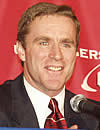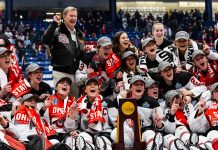Wisconsin fans with a sense of history may tell you the last time the Badgers had a coaching change, the new coach won the national title in his first season.
Reality will tell you Ronald Reagan isn’t in the White House, new episodes of M*A*S*H aren’t being produced and this isn’t a spinoff of the solid Badgers teams of the early 1980s.
Jeff Sauer took over the Badgers from Bob Johnson 20 years ago and kept them a winner throughout most of his tenure. Mike Eaves takes over for Sauer this season and has a different challenge: Make them a consistent winner again.
Eaves’ task isn’t as monumental as some other new coaches in the WCHA. He doesn’t have to rebuild a program that’s perennially been a loser. Rather, his charge is to get Wisconsin back near the top of the league, something that gets tougher as the best teams get stronger.
If Eaves has his way, that will come as a result of a new attitude and a concentration on conditioning. But one thing he won’t do is focus on what’s happened in the past.
Eaves, who came to Wisconsin from the USA Hockey National Team Development Program, hasn’t watched a second of tape of the Badgers from last season. Not even a glance to see what he’ll be working with.
This is a clean slate in Madison. The returning players are the same, but what’s expected of them may not be.
“In my own mind, I know what we want these guys to do,” Eaves said. “I think it’s a good thing that they know they can come in, there’s no predetermined schemes of who they are and what they are, they can just come in and show us what they’ve got.
“I moved around a lot when I was younger and I always liked the fact that when I moved to a new neighborhood, nobody knew me. I could be whoever I wanted to be. I always thought that I’m going to be a better version of who I was when I get to a new place because there’s no preconceived ideas. That’s what these fellas have right now.”

Eaves readily admits he isn’t sure what he’ll get from his players this season because of the fresh start. But peeking into the crystal ball …
Talk is that Kabotoff, who finally got his chance to play last season after two years backing up Graham Melanson, and Bruckler, a freshman last season who had strong nights and off ones, form the best goaltending tandem in the league after Denver’s Wade Dubielewicz and Adam Berkhoel.
While that stat might testify to the worth of the goaltenders, it’s an indictment of the defense. The Badgers return most of their defense from last season, and the hope for Wisconsin has to be that they’ll take a big step in development.
Dan Boeser, Andy Wozniewski and Brian Fahey have WCHA experience, but, as a whole, the UW defense is unproven.
Rene Bourque is the only other forward that showed significant scoring prowess last season, if you consider 12 goals and 19 points significant. The Badgers need more production from players like Jake Heisler and Erik Jensen, both of whom played in most of the 39 games last season but scored only seven and six points, respectively.
There’s also an opportunity for newcomers to play a major role. Pete Talafous is eligible to play after sitting out last season because he transferred from Alaska-Anchorage. Small center Nick Licari and winger Ryan MacMurchy are part of a freshman class that has impressed the older players in captains’ practices.
Eaves knows what he wants his team to be — poised, well-conditioned and focused on the system. He has instituted a rigorous offseason workout schedule, which included a 5-mile run the players had to complete in 38 minutes.
He said all but about five players made the time, and the slowest runner finished in about 40 minutes.
Perhaps more importantly, players were encouraging their teammates, building the kind of camaraderie Eaves wants. Some of that encouragement came from Boeser, who was diagnosed this summer as having follicular B-cell lymphoma. He recently completed a series of radiation treatments designed to wipe out the disease.
While the aggressive treatment didn’t allow Boeser to take part in most of the dry-land training, he was right there the whole time. His goal is not to miss a game — the Badgers open against Rensselaer in the Ice Breaker on Oct. 11.
“Danny got hit right in the stomach, knocked the wind out of him with this announcement,” Eaves said. “What he has done is living proof of what we want all our guys to do. Say, ‘I’m going to get up every day and do the best I can. I’m going to control the things I can control and get out of the day what I can.’
“He’s done that and by having that type of attitude, I firmly believe in my own mind that’s where he is in terms of conditioning. He’s not that far off because he had that attitude. … You could talk about trying to get this character trait, but Danny lived it and he was a demonstration to his teammates.”


